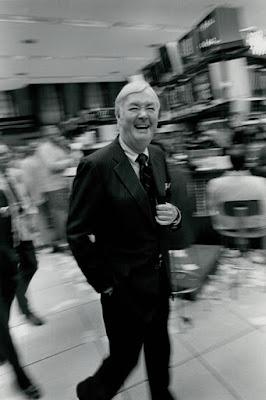Boy, could we use him now.
The beauty and importance of the new documentary MOYNIHAN, from filmmakers Joseph Dorman and Toby Perl Freilich (shown above, with Ms Freilich on the right), lies in its ability to show both young and old generations who this singular man was and what he was able to accomplish via his intelligence and perseverance, as well as his understanding and appreciation of the human condition in so many of its seemingly contradictory forms. Consequently, he was able to convince a right-wing President such as Richard Nixon to actually pursue the much-needed goal of equality for all perhaps even more than the supposedly left-wing President, Lyndon Johnson.
As in his astonishingly fine documentary, Sholem Aleichem: Laughing in the Darkness, as well as in his difficult and hugely challenging doc, Colliding Dreams, (co-directed by Oren Rudavsky), Mr. Dorman, together with Ms Freilich (Inventing Our Life: The Kibbutz Experiment) weave together history (personal, political, national) with philosophy and talking-head interviews that together create a rich and deep portrait of a man -- shown above in his earlier years, below in a later decade -- who arguably contributed as much as, probably more, than anyone else toward bringing the USA closer to its original commitment to life, liberty and the pursuit of happiness because he understood something that seems to have eluded much of America today: Freedom without equality is not worth very much.
Even more (much more, in fact) that this year's earlier and popular doc on Ruth Bader Ginsburg, RBG, Moynihan is chock full of the kind of intelligence, fact and detail that will keep you glued to the screen and savoring every word. The film is dense but accessible, challenging but entertaining. And, as we've come to expect from Dorman, it never unduly pushes a particular theory or connection. It does, however, connect.
Take Moynihan's famous "report," which raised an alarm about the high number of black families in which the father was not present and what this had done to the family and its fortunes. From this documentary we learn that Moynihan himself was the product of a family in which Dad went missing fairly early on. While no underscoring or psychological second-guessing are given here, the connection between Moynihan's life and his report will surely not go unnoticed by viewers.
Again, though no cheap-jack psychology is offered here, the documentary manages to build not only an adept history of the man -- his labors, beliefs and goals -- but also a quietly appropriate psychological profile, as well. We hear from his wife, Elizabeth (above) and one of his children (Moynihan himself died in 2003), as well as from co-workers, politicians, journalists (Ta-Nehisi Coates, below) and employees, and the combined result is a portrait teeming with life, ideas and ideals.
Though some liberals labeled the man a neo-conservative, while the right-wing called him everything from Socialist to Communist, the actual Moynihan was, as he preferred, adverse to any easy label. And though he sometimes appeared to contradict even himself, this was usually because he made certain he had the proper statistics and facts in front of him prior to coming to a conclusion. Would that more Americans had -- and exercised -- this ability. In one scene, while he was Ambassador to the United Nations (below), he gives a rousing and angry defense of the state of Israel. (I would like to think that, were he alive today, he might find that little state's current actions much less worthy of praise or defense.)
Moynihan, -- running 104 minutes and distributed by First Run Features -- opens this Wednesday, October 3, for its U.S. theatrical premiere in New York City at Film Forum; on October 11 at Time and Space Limited in Hudson, New York; on October 12 in Los Angeles at Laemmle's Music Hall 3; and in on October 19 at the AFI Silver Theater.
Elsewhere? I sure hope so. This movie deserves to play every major city in the USA. Perhaps, once word get out, it will.
Meanwhile, click here to view updated playdates, cities and theaters.









No comments:
Post a Comment